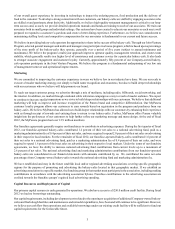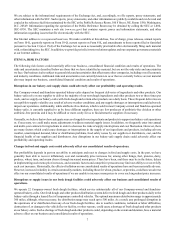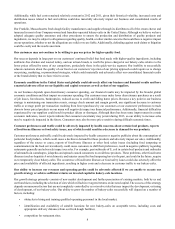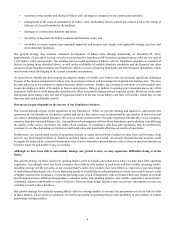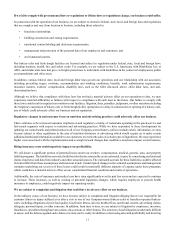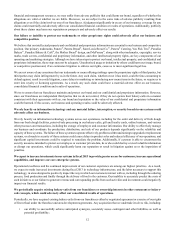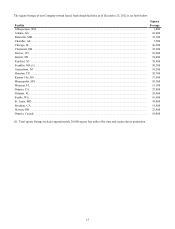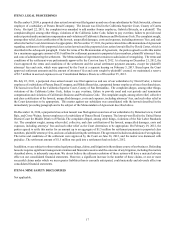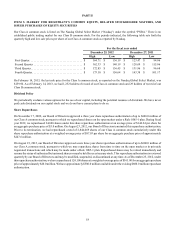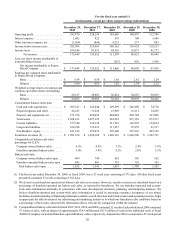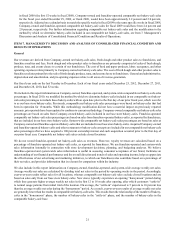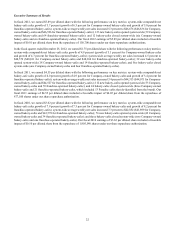Panera Bread 2012 Annual Report Download - page 21
Download and view the complete annual report
Please find page 21 of the 2012 Panera Bread annual report below. You can navigate through the pages in the report by either clicking on the pages listed below, or by using the keyword search tool below to find specific information within the annual report.13
• failure to successfully integrate the acquired entity’s operational and support activities;
• unanticipated changes in business and economic conditions;
• limited or no operational experience in the acquired bakery-cafe market;
• future impairment charges related to goodwill and other acquired intangible assets; and
• risks of dispute and litigation with the seller, the seller’s landlords, and vendors and other parties.
Any of these factors could strain our financial and management resources as well as negatively impact our consolidated results
of operations.
Our operating results fluctuate due to a number of factors, some of which may be beyond our control, and any of which
may adversely affect our consolidated financial condition.
Our operating results may fluctuate significantly from our forecasts, targets, or projections because of a number of factors, including
the following:
• changes in average weekly net sales and comparable net bakery-cafe sales due to:
• lower customer traffic or average check per transaction, including as a result of the introduction or removal of new
menu items;
• changes in demographics, consumer preferences, and discretionary spending;
• negative publicity about the ingredients we use or the occurrence of food-borne illnesses or other problems at our
bakery-cafes; and
• seasonality, including as a result of inclement weather.
• cost increases due to:
• changes in our operating costs;
• labor availability and increased labor costs, including wages of management and associates, compensation, insurance,
and health care; and
• changes in business strategy including concept evolution and new designs.
• profitability of new bakery-cafes, especially in new markets;
• delays in new bakery-cafe openings; and
• fluctuations in supply costs, shortages, or interruptions.
Increased advertising and marketing costs could adversely affect our consolidated results of operations.
We expect our advertising expenses to continue to increase and to dedicate greater resources to advertising and marketing than in
previous years. If new advertising and other marketing programs, including our digital advertising or national cable television
advertising, do not drive increased net bakery-cafe sales or if the costs of advertising, media, or marketing increase greater than
expected, our consolidated results of operations could be materially adversely affected.
Our federal, state, and local tax returns have been, and may in the future be, selected for audit by the tax authorities, which
may result in tax assessments or penalties that could have a material adverse impact on our consolidated financial position
and results of operations.
We are subject to federal, state, and local taxes in the United States and Canada, including income, sales, use, and other applicable
taxes. Significant judgment is required in determining the provision for taxes. Additionally, sales and use tax requirements are
often fact-specific, complex and vary from jurisdiction to jurisdiction, which complicates monitoring and compliance. Although
we believe our tax estimates are reasonable and our procedures for collecting sales taxes are appropriate, from time to time, federal,
state, and local tax authorities have challenged, and may in the future challenge, positions we have taken on our tax returns or our


